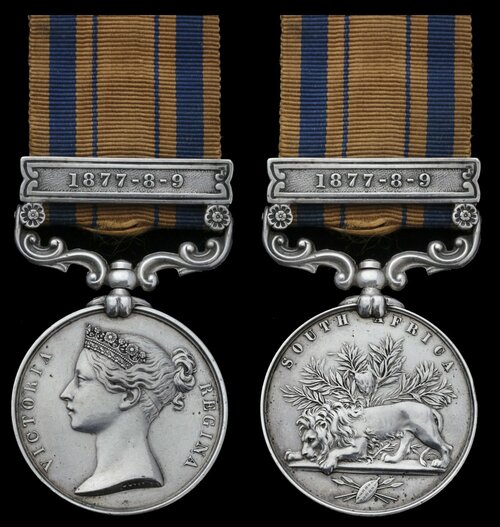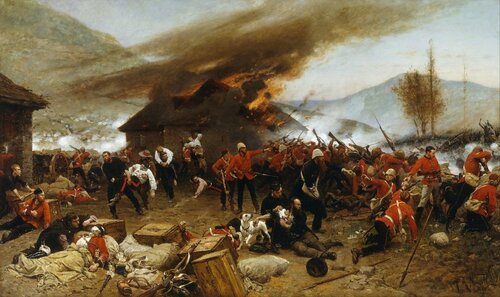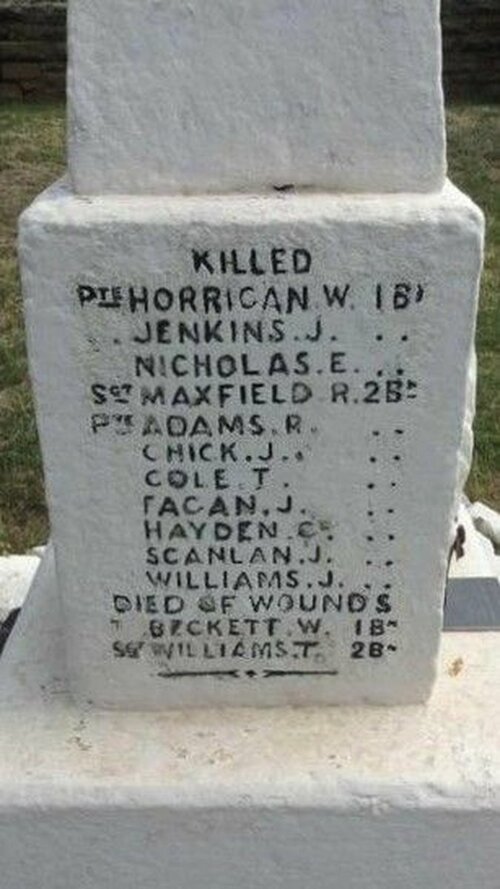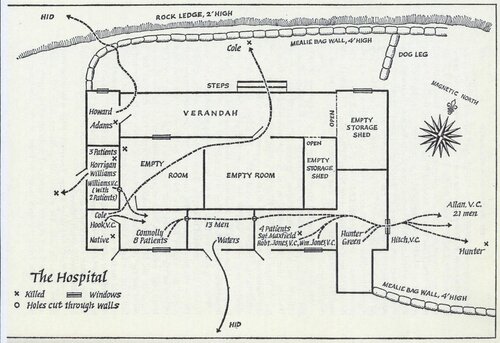Auction: 22001 - Orders, Decorations and Medals
Lot: 1
RORKE'S DRIFT - THE GREATEST DEFENCE OF ALL
There can surely be no more inspiring tale than that of 'the few' who found themselves at the former mission station of Rorke's Drift near the Buffalo River, Natal Province on 22-23 January 1879. It goes without saying that to date no action in British military history has eclipsed the feats performed, neither in terms numerical disadvantage - at least 40 to 1 - or the level to which the engagement has resonated through the ages.
When dawn broke on 23 January, the scene was of utter desolation, the bodies of at least 351 Zulu warriors littering the ground. What the defenders had faced seems almost impossible to surpass. That they stood firm remains a testament to their accumulated bravery, resilience and presence of mind.
The medallic awards for those present at Rorke's Drift are also worthy of mention, for no fewer than 11 Victoria Crosses and 4 Distinguished Conduct Medals were awarded for the actions of that famous day.
In terms of public perceptions the legacy of the defenders was perhaps sealed in history with the reception of Stanley Baker's film Zulu, which transported millions of transfixed viewers to the scene of battle in a 139-minute epic. I have little doubt that most of us have likewise been transfixed - perhaps inspired - at some point in our lives on a long Sunday afternoon watching that film.
In a strange chance of fate - which seems to strike often in this specialist field - in May 2019 I was entrusted to catalogue the Medals of Gunner A. Howard, 'N' Battery, 5th Brigade, Royal Artillery, one of just four members of the Royal Artillery present at the Defence of Rorke's Drift. Whilst researching his remarkable story I was drawn to the fact that he shared a room in the Hospital with Private Robert Adams, 'D' Company, 2nd Battalion, 24th Foot, who was one of that gallant Band of Brothers who lost his life during the Defence. It seems incredible that less than three years later that Medal should be entrusted to my charge. I trust you will appreciate reading about his bravery - and tragic death - in this legendary action.
Marcus Budgen, March 2022.
The Casualty Roll
1st Battalion, 24th Foot (3 killed in action, 1 mortally wounded)
Beckett, William. Private. 25B/135, died of wounds 23 January 1879
Horrigan, William. Private. 1-24/1861, killed in action
Jenkins, James. Private. 25B/841, killed in action
Nicholas, Edward. Private. 25B/625, killed in action
2nd Battalion, 24th Foot (8 killed in action, 1 mortally wounded)
Adams, Robert. Private. 25B/987 D Company, killed in action
Chick, James. Private. 25B/1335 D Company, killed in action
Cole, Thomas. Private. 25B/801 B Company, killed in action
Fagan, John. Private. 25B/969 B Company, killed in action
Hayden, Garret. Private. 2-24/1769 D Company, killed in action
Maxfield, Robert. Sergeant. 25B/623 G Company, killed in action
Scanlon, John. Private. 25B/1051 A Company, killed in action
Williams, Joseph. Private. 25B/1398 B Company, killed in action
Williams, Thomas. Lance-Sergeant. 25B/1328, died of wounds 23 January 1879
Other units (4 killed in action)
Army Commissariat and Transport Department; Byrne, Louis Alexander. Acting Storekeeper, (civilian attachment), killed in action
1st Battalion 3rd Regiment Natal Native Contingent; A Private of Mkungo's tribe, killed in action
2nd Battalion 3rd Regiment Natal Native Contingent; Anderson, Michael. Corporal, killed whilst deserting
Natal Mounted Police; Hunter, Sydney H. Trooper., killed in action.
The historically important Zulu War Medal awarded to Private R. Adams, 'D' Company, 2nd Battalion, 24th Foot, who was killed in action at the Defence of Rorke's Drift
South Africa 1877-79, 1 clasp, 1877-8-9 (987. Pte. R. Adams. 2/24th. Foot.), highlights a little polished, very fine
Purchased: Spink, 12 December 1994 (the original bill of Sale accompanies the Lot).
Robert Adams attested on 21 December 1876 and had previously served with the East Middlesex Militia. Posted to the 2nd Battalion, 24th Foot on 22 January 1877 and was thence sent to the General Depot from 1 November-21 December 1878. He served with 'D' Company and was a patient at Rorke's Drift at the time of that epic Battle. Adams shared the left-front corner room of the hospital building with Gunner Howard, as recalled in The Washing of the Spears which confirms the location of Adams and the fact that he gave vital effort to the Defence of this particularly vulnerable sector of their perimeter:
'Although their room represented a blank wall to the side, a window opened to the front and a door gave onto the inset veranda. The men [Adams and Howard] were both ambulatory, and they barricaded the door and the window and knocked loopholes out to the side.'
A letter penned by Howard on 7 February gives his own take on the opening shots, which rang out from around 1630hrs:
'Just a line to let you know that I am still in the land of the living. I daresay before you get this you will have heard of the massacre [Isandhlwana]. They killed just half of our battery and nearly all the 1/24th Regiment. The awful black devils watched the General out of the camp, and then, as soon as his command had got clear away, they came down like bees out of a hive, and there was awful slaughter.
I was not in the camp, for I had the diarrhoea and was left behind at a place they call Rorke's Drift, where there was a temporary hospital. One company of the 24th, ninety strong, was left to protect it.
Well, the same day as the other affair happened about which I have just told you four thousand or so of them paid us a visit at the hospital. But we had about three hours' notice and plenty of sacks of oats with which we threw up a temporary fortification round this old place. When the Zulus arrived, about five in the evening, they did not find it quite as comfortable as they thought, for they had expected us that they would have nothing to do but assegai us at their pleasure and possess the place, but we had knocked holes through the house to fire through. Boxes of ammunition were placed behind us.
Forty men were in the hospital, and nearly all able to fight when it came to the pinch. I had a rifle belonging to the Sergeant which was too ill to use it. The Zulus made short work of him [Sergeant R. Maxfield, 2nd Battalion, 24th Regiment].
When waiting for the approach of the enemy we would see them half a mile before they got to us. But I was wrong, and we all agreed to fight till only two were left, and these were to shoot themselves. Well, we all got behind our rampart, and when the Zulus were about four hundred yards off, like a wall coming on, we fired the first volley. The rifles being Martini-Henrys our firing was very quick, and, when struck by bullets they would give a spring in the air and fall flat down. The enemy advanced to within three hundred yards, and then it did not seem healthy to come any nearer, so we continued to fire at them until it got dark. Then, as the roof of the hospital was of thatch, they crept up and set it on fire. When the flames burst out it was all the better for us, for we could see them and their movements, though they could not see us. Didn't we give it to them, anyhow!'
As the day rolled on, the situation for the Defenders grew more desperate. The attacks from the Zulu's came from all angles and whilst they fired out across the rock ledge which laid to the north of the Hospital, the constant fear of the inevitable break-in rose. The chant of thousands of Zulu warriors giving 'uSuthu' at the top of their voices, amongst the sound of rifle fire, cannot be imagined and a deafening crescendo would have formed. The Washing of the Spears continues:
'Only Howard, Adams and Private Horrigan were helping on the far side, where hundreds of Zulus were massed, waiting to join the attacks on the front wall.'
The hospital by now was alight, its straw thatch adding further to the plight of those who remained. With the front of the building now abandoned, those who remained were in grave danger of being overran. In the adjacent room to the south along the wall, Joseph Williams met his death, in the same grim fate which would shortly befall Adams. Gunner Howard made his call to try to save his life and that of Adams, but his sick and exhausted state meant he could not make the same dash which Howard made:
'A few men were still alive in other rooms. The roof was about to go, and Howard opened the door a crack to peer out. The Zulus on the veranda were all pressed in the far corner, taking shelter from the storehouse fire, and none was watching behind. Adams refused to leave, so Howard pulled the door open, hurtled out across the veranda and sprang over the mealie bags into the welcome darkness below the ledge. He rolled through the shrubbery, fetching up against four dead horses that the Zulus had killed tethered in the trees.'
Gunner Abraham Evans recalled the final vision of Adams in The Rorke's Drift Men: Heroes of the Zulu War:
'I was then standing in the doorway of the hospital, and witnessed five Zulus come in front of the doorway, jumping in their mad frenzy and flushed with their late victory. Just at this moment my newest mates were Adams and Jenkins of the 24th Regiment. What became of these men I can't say, I never saw them again after'.
According to Private Hook '...John Williams had held the other room with Private William Horrigan for more than an hour, until they had not a cartridge left. The Zulus then burst in and dragged out Joseph Williams and two of the patients and assegaid them'. These two men were Private Adams and Drummer Hayden of 'D' Company.'
The death of Adams would have followed that of the brutal ritual death with befell his comrade:
'The Zulus spread-eagled Joseph Williams on his back, pulled away his belt and tore his tunic open. An assegai ripped down through his exposed belly, a dozen blades plunged into his body, and the maddened warriors quartered him and tore the corpse to bloody shreds.'
His remains were buried with his comrades in the cemetery at Rorke’s Drift and his name inscribed on the memorial which stands there to this day.
The actions of Private Robert Adams are forever carved into the history of perhaps 'The Greatest Defence of All'.
His effects, which included his Medal with clasp '1877-8-9' were claimed by his family.
Reference sources:
The Washing of the Spears, Donald R. Morris, 1965.
Invasion of Zululand, 1879: Anglo-Zulu War experiences of Arthur Harness; John Jervis, 4th Viscount St. Vincent; and Sir Henry Buller, Brenthurst Press, 1979.
Rorke's Drift, Michael Glover, 1997.
The South African Campaign of 1879, J. P. Mackinnon & S. H. Shadbolt, 1973.
The Silver Wreath.
Subject to 20% VAT on Buyer’s Premium. For more information please view Terms and Conditions for Buyers.
Sold for
£58,000
Starting price
£35000











